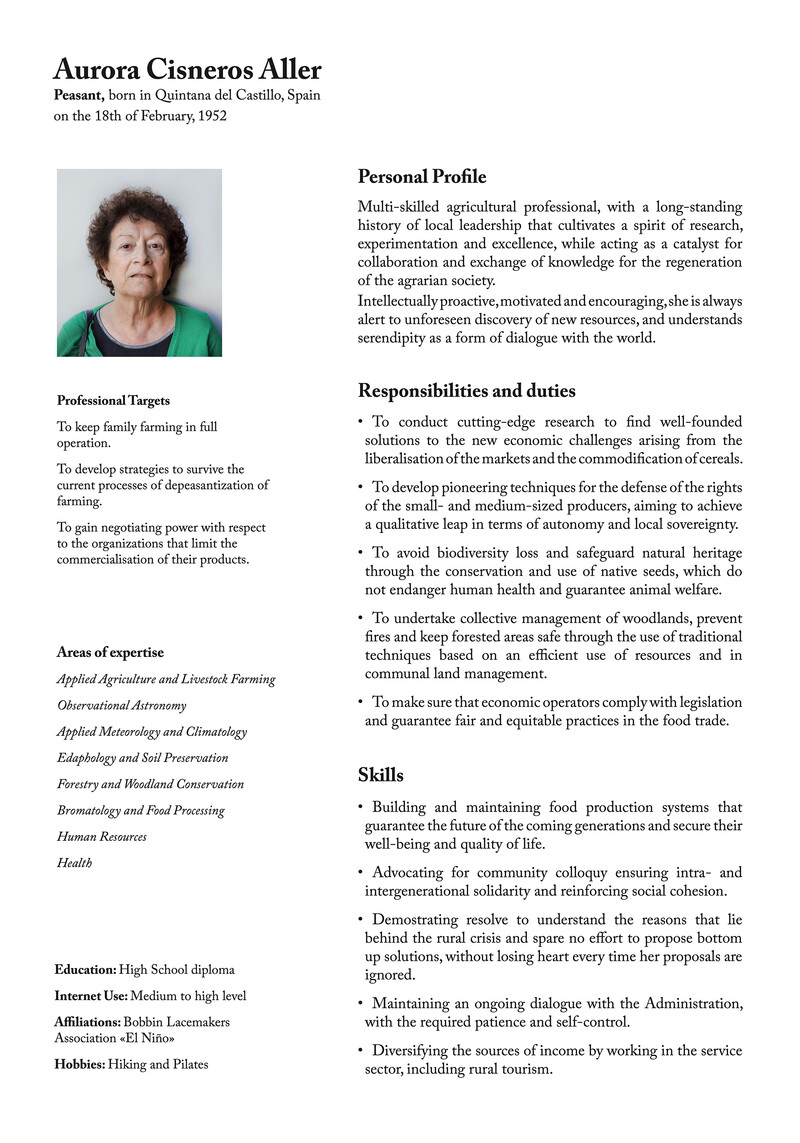- 13.0Cover
- 13.1How to Read this Broadsheet
- 13.2Butterfly EffectsMaggie Groat
- 13.3what the river reveals: remembering like the waterCéline Chuang
- 13.4Dechinta | In the Bush: Northern Harvesting and Land-based LearningLianne Marie Leda Charlie
- 13.5Filling Spirits: Community-oriented Cuisine and GardeningRobin Buyers, Sienna Fekete, Sonia Hill, Camille Mayers, Vasuki Shanmuganathan
- 13.6Interview with OmehenThe Forest Curriculum
- 13.7Parasitic OscillationsMadhur Anand
- 13.8Msit No’kmaq: Deepening Relations with Mother EarthCarolynne Crawley
- 13.9Thinking with Black Ecologies in Educational ResearchFikile Nxumalo
- 13.10Peasant CVAsunción Molinos Gordo
- 13.11How Not to be ConsumedAimi Hamraie, Maria Hupfield, Zoë Wool
- 13.12Against RenewalChristina Sharpe
- 13.13Rooting in ExileMagdalyn Asimakis
- 13.14Glossary
Peasant CV
- Asunción Molinos Gordo
In Peasant CV, Asunción Molinos Gordo employs the aesthetics and language of professional resumes to highlight the skilled labour of peasant farmers in León, Spain. Through use of bureaucratic buzzwords, Gordo satirizes the rhetoric of state and NGO-led conservation practices that often de-value local knowledges. Gordo employs this language to foreground the expert knowledges gained through multigenerational working-class experience. The land-based knowledge of peasant farmers is often dismissed as archaic; this stigma further endangers a peasant way of life. With the ongoing expansion of industrial agriculture that privileges monopolies, monocrops, and global markets in Spain and beyond, small-scale farmers face threats to their lifeways. Not only does peasant farming provide employment to rural people, it also carries traditions of valuing biodiversity, using sustainable cultivation practices, maintaining culture, and building interconnected communities. The loss of peasant farming would also mean the loss of the life-preserving practices that come with it.
The resumes in Peasant CV implicitly chart peasants’ struggles against exploitation, food insecurity, and ecological crisis in an industrial age. Gordo’s practice begs the questions: How can community-based knowledge and rural livelihoods be acknowledged and honoured? How can traditional conservation strategies be preserved through farming? What sustains dignified work?


See Connections ⤴